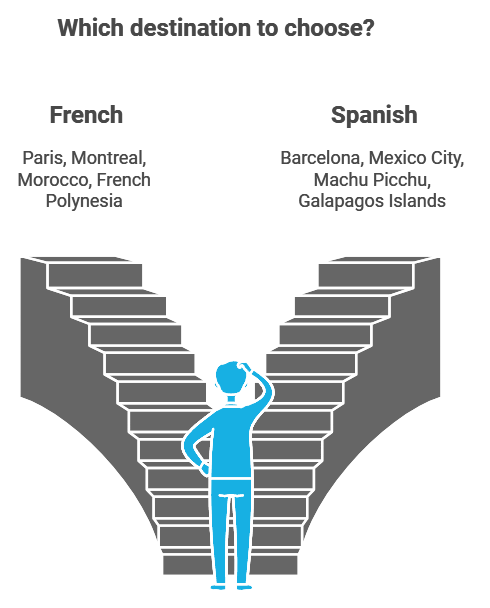Should You Learn French or Spanish?
Choosing between learning French or Spanish depends on your personal goals, interests, and circumstances. Both languages offer unique benefits and opportunities. The best choice for you will depend on factors like your career aspirations, travel plans, and cultural interests. Let’s explore these languages to help you make an informed decision!
Key Takeaways
- French and Spanish are both widely spoken and offer great career opportunities
- Spanish is generally easier for English speakers to learn
- French is important in diplomacy and international organizations
- Spanish is increasingly valuable in the US job market
- Both languages provide rich cultural experiences
- Your personal interests should guide your choice
- Learning either language offers cognitive benefits
- Consider your long-term goals when deciding
Comparing French and Spanish: Linguistic Aspects
Let’s start by looking at how these languages compare linguistically. This can help you understand what to expect when learning either language.
Pronunciation and Phonetics
Spanish pronunciation is often easier for English speakers. Most letters are pronounced consistently, and the sounds are similar to English. French, on the other hand, has some tricky sounds like nasal vowels and the famous “r” sound. It also has many silent letters.
Grammar Structures
Both languages have similar grammar structures, as they’re both Romance languages. But there are some key differences:
- Spanish has two forms of “to be” (ser and estar)
- French has more irregular verbs
- Spanish verb conjugations are generally more regular
Vocabulary and Cognates
Good news! Both French and Spanish share many words with English. These similar words are called cognates. For example:
| English | French | Spanish |
|---|---|---|
| Family | Famille | Familia |
| Important | Important | Importante |
| Animal | Animal | Animal |
This shared vocabulary can give you a head start in both languages. 😊
Language Learning Difficulty
The Foreign Service Institute (FSI) ranks languages by difficulty for English speakers. Here’s how French and Spanish compare:
- Spanish: Category I (easiest) – 24-30 weeks to reach professional working proficiency
- French: Category I (easiest) – 30-36 weeks to reach professional working proficiency
While both are considered relatively easy for English speakers, Spanish is often found to be slightly easier due to its more phonetic nature and regular verb conjugations.
Global Reach and Influence
Both French and Spanish are widely spoken around the world. Let’s look at their global reach:
French-Speaking Countries and Regions
French is official in 29 countries, including:
- France
- Canada
- Many African countries
Spanish-Speaking Countries and Regions
Spanish is official in 21 countries, including:
- Spain
- Most of Latin America
- Equatorial Guinea in Africa
Spanish has more native speakers worldwide, while French is more widely distributed geographically.
Career Opportunities
Both languages can boost your career prospects. Here’s a quick comparison:
| French | Spanish |
|---|---|
| Important in diplomacy and international organizations | Widely used in business in the Americas |
| Key in luxury goods, fashion, and culinary industries | Growing importance in U.S. job market |
| Valuable in African economic markets | Essential for working with Hispanic communities in the U.S. |
Cultural Considerations
Learning a language opens doors to new cultures. Both French and Spanish offer rich cultural experiences:
Literature and Arts
- French: Think Victor Hugo, Monet, and the Louvre
- Spanish: Imagine Cervantes, Picasso, and the Prado Museum
Music and Cinema
- French: From classic chansons to modern pop and award-winning films
- Spanish: Salsa, reggaeton, and a booming film industry in both Spain and Latin America
Travel and Study Abroad Opportunities
Both languages offer exciting travel and study options:
- French: Paris, Montreal, Morocco, French Polynesia
- Spanish: Barcelona, Mexico City, Machu Picchu, Galapagos Islands
Many universities offer study abroad programs in French and Spanish-speaking countries. These can be great for language immersion!

Language Learning Resources
There are tons of resources for learning both languages:
- Apps: Duolingo, Babbel, Rosetta Stone
- Online courses: Coursera, edX
- YouTube channels and podcasts
- Traditional classes and textbooks
Cognitive Benefits of Language Learning
Learning either French or Spanish can boost your brain power! Benefits include:
- Improved memory
- Better multitasking skills
- Delayed onset of cognitive decline in older adults
Making Your Decision
When choosing between French and Spanish, consider:
- Your personal interests
- Career goals
- Travel plans
- Cultural attractions
- Learning resources available to you
Remember, there’s no wrong choice. Both French and Spanish are beautiful, useful languages that can enrich your life in many ways.
Conclusion
So, should you learn French or Spanish? The best choice is the one that aligns with your goals and interests. If you’re drawn to the elegance of French culture or dream of exploring Paris, go for French. If you’re excited about Latin American music or want to travel through Spain, choose Spanish.
Both languages offer fantastic opportunities for personal growth, career advancement, and cultural exploration. The most important thing is to enjoy the learning process. Whichever you choose, you’re embarking on an exciting journey of language learning. Bonne chance or buena suerte! 🌍🗣️
